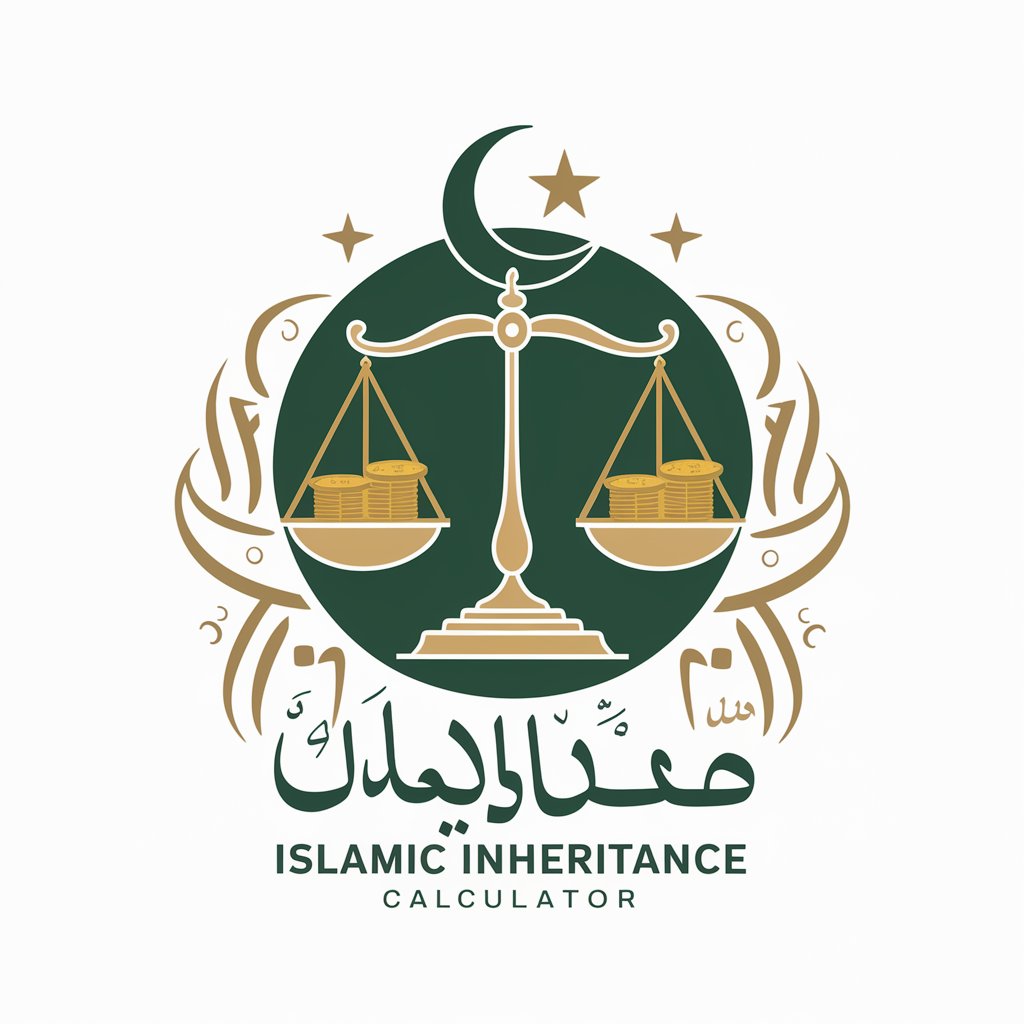
Islamic Inheritance Calculator - Sharia-compliant Estate Planner

Welcome to the Islamic Inheritance Calculator.
Automate Your Inheritance Calculations
What is the total inheritance amount?
Please specify the family composition of the deceased.
Which school of thought (Mazhab) do you follow?
Are there any debts or obligations to be paid first?
Get Embed Code
Introduction to Islamic Inheritance Calculator
The Islamic Inheritance Calculator is designed to automate the complex calculations required under Islamic inheritance laws, adhering to the rules specified in the Quran and Sunnah, as well as the interpretations from the four Sunni Madhabs (Hanafi, Maliki, Shafii, and Hanbali). Each school of thought has nuanced differences in inheritance rules which can significantly affect the distribution outcomes. For example, when calculating inheritance shares, specific conditions like the presence of a paternal grandfather or siblings can alter the entitlements drastically as per different Madhab views. This tool asks users about their preferred Mazhab, the total inheritance, and family composition, and calculates shares accordingly. Powered by ChatGPT-4o。

Main Functions of Islamic Inheritance Calculator
Calculation of Quranic Shares
Example
For an estate of $500,000, with a deceased who leaves behind a wife, two daughters, and parents, the calculator can quickly distribute the shares according to the specified Madhab; for example, according to the Hanafi school, the wife receives 1/8, each daughter receives 1/3, and the parents receive 1/6 each.
Scenario
A family seeks to distribute an inheritance among surviving members without error and in compliance with Islamic law.
Adjustment for Radd
Example
In a scenario where the total calculated shares do not sum up to 100% of the estate, the calculator performs 'Radd' (augmentation) to redistribute the excess among eligible heirs in accordance with the rules of the selected Madhab.
Scenario
The heirs include a wife and distant kindred, and the initial distribution leaves surplus funds. The calculator redistributes these funds according to the specific rules of the Hanafi or Hanbali Madhab.
Consideration of Special Cases
Example
In complex family structures, such as those involving stepchildren or adopted children, the calculator considers the specific stipulations of the chosen Madhab to accurately determine eligibility and share proportions.
Scenario
A user needs to distribute an inheritance in a blended family scenario where there are children from multiple marriages.
Ideal Users of Islamic Inheritance Calculator Services
Islamic Scholars and Students
Scholars and students of Islamic jurisprudence can use the calculator as a practical tool to understand and apply the complex rules of Islamic inheritance in hypothetical or real scenarios, ensuring their calculations are accurate and adherent to Islamic teachings.
Legal Professionals
Lawyers and legal advisors specializing in Islamic law can use this calculator to provide precise legal advice and services to their clients who wish to distribute estates according to Islamic inheritance laws.
Muslim Families
Families looking to distribute a deceased member’s estate can use the calculator to ensure the distribution is compliant with Islamic law, reflecting their religious values and legal rights of all parties involved.

Steps for Using the Islamic Inheritance Calculator
Step 1
Visit yeschat.ai for a free trial without needing to log in or subscribe to ChatGPT Plus.
Step 2
Select the preferred Mazhab (Islamic legal school) as this affects the inheritance calculations due to differing jurisprudential opinions.
Step 3
Input the total amount of inheritance left by the deceased. Ensure all assets are correctly evaluated and included.
Step 4
Enter the family composition and other potential heirs as specified in Islamic law to determine their share of inheritance.
Step 5
Review the automatically calculated shares for each heir. Consult a qualified Islamic scholar for a detailed fatwa to ensure compliance with Sharia law.
Try other advanced and practical GPTs
ePapuga
Revolutionizing Legal Solutions with AI

📘 Master OOP Concepts in C++
Empower your coding with AI-driven OOP learning.

Geneticist
Unlocking Genetics with AI

Dead Wax Discoveries
Unlocking the Secrets of Vinyl Quality

Aura Style
Style & Insight at Your Command

Aura Jive Marketing Agency
Powering Marketing with AI

Concise Communicator
Clarify your communication with AI

Corrector
AI-powered text correction made easy

Brainiac
Empower your projects with AI-driven insights.

Brainiac
Powering Insights with AI-Driven Updates

Bible Brainiac
AI-powered biblical understanding

Carson's Wit
Reviving Carson's charm with AI

Frequently Asked Questions about the Islamic Inheritance Calculator
What is the Islamic Inheritance Calculator?
The Islamic Inheritance Calculator is a tool designed to compute the distribution of a deceased Muslim's estate according to Islamic law. It considers different jurisprudential rules from various Sunni Mazhabs to cater to diverse users.
Can the Islamic Inheritance Calculator handle complex family structures?
Yes, the calculator is capable of handling complex family structures, including multiple wives, children from different marriages, and distant kindred, adjusting the shares based on the specific Mazhab selected.
Does the tool take into account the differences between Sunni Mazhabs?
Yes, it allows users to choose between different Sunni Mazhabs like Hanafi, Maliki, Shafii, and Hanbali, each of which has unique rules affecting the inheritance distribution.
What should I do if the calculated shares seem incorrect?
It's important to double-check all entered data for accuracy and consult with a knowledgeable Islamic scholar who can provide a fatwa based on your specific circumstances and chosen Mazhab.
Are there any legal implications of using this tool in my country?
The tool is designed for religious guidance according to Islamic law and may not align with local civil laws. Users are advised to consult legal and religious experts to ensure both civil and religious compliance.





